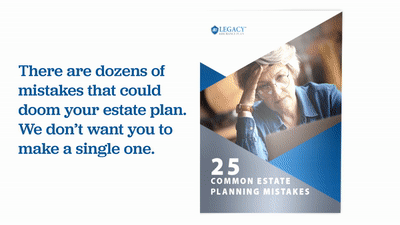Estate planning is an important duty, but it can seem daunting. There’s a lot to sort out between wills, trusts, probate, powers of attorney, advance directives, asset protection and other legal documents and issues that are crucial aspects of securing your financial future and ensuring your wishes are carried out after you're gone. However, many people find themselves putting off this important task, often with dire consequences for their loved ones.
In this article, we'll explore four common excuses – and pretty lame excuses if you think about it – for procrastinating on estate planning. We’ll also discuss some compelling reasons why you should take action sooner rather than later.
Why do people put off estate planning?

Estate planning is a critical process that involves making decisions about how your assets will be managed and distributed after your death. Despite its importance, many individuals delay or avoid estate planning altogether. The top five excuses people use to justify their procrastination are:
- Believing they're too young to worry about it.
- Thinking they don't have enough assets to justify a plan.
- Feeling that estate planning is too complicated and time-consuming.
- Being uncomfortable with thinking about their own mortality.
Let's debunk these excuses and explore why they're not valid reasons to delay this crucial task.
What is estate planning and why is it important?

Estate planning is the process of arranging for the management and distribution of your assets during your lifetime and after your death. It involves creating legal documents such as wills, trusts and powers of attorney to ensure your wishes are carried out and your loved ones are protected.
The importance of estate planning cannot be overstated. It provides numerous benefits, including ensuring your assets are distributed according to your wishes, minimizing taxes and legal fees for your heirs, protecting your beneficiaries (especially minor children), avoiding family disputes and legal battles and preserving your legacy and supporting causes you care about.
Now, let's address the top five excuses for procrastinating on estate planning in detail.
Excuse No. 1: "I'm too young to worry about estate planning."
This is perhaps the most common excuse people use to avoid estate planning. Many individuals believe that estate planning is only for the elderly or those nearing retirement. However, this couldn't be further from the truth.
The reality is that life is unpredictable, and tragedies can strike at any age. By creating an estate plan early in life, you ensure that your assets and loved ones are protected, regardless of what the future holds. Additionally, starting your estate planning journey at a younger age allows you to make informed decisions without the pressure of time constraints, revise and update your plan as your life circumstances change, take advantage of long-term tax planning strategies, and gain peace of mind knowing your affairs are in order.
Consider the case of a young couple in their early 30s with a newborn child. While they may feel invincible and far from needing an estate plan, creating one at this stage can be crucial. It allows them to designate guardians for their child, ensure their assets are managed properly for their child's benefit if something were to happen to both parents, and potentially set up trusts to protect their child's inheritance until they reach a certain age.
Moreover, young adults often underestimate the value of their estate. When you factor in life insurance policies, retirement accounts and potential future inheritances, your estate may be worth more than you think. Starting early gives you the opportunity to grow and protect these assets effectively.
Excuse No. 2: "I don't have enough assets to justify an estate plan."
Another common misconception is that estate planning is only necessary for the wealthy. In reality, everyone can benefit from having an estate plan, regardless of their financial status. Even if you don't own significant assets, an estate plan can help you designate guardians for minor children, specify your health care wishes through advance directives, appoint someone to manage your finances if you become incapacitated, ensure your modest assets are distributed according to your wishes and avoid burdening your loved ones with difficult decisions during emotional times.
Remember, estate planning is not just about money – it's about making your wishes known and protecting your loved ones.
Consider a single parent with a modest income and few assets. While they may not have a large estate to distribute, an estate plan is crucial for naming a guardian for their child and ensuring any assets, no matter how small, are used for the child's benefit. Without a plan, the court would decide who raises the child and how any assets are managed, which may not align with the parent's wishes.
Furthermore, estate planning encompasses more than just financial assets. It includes making health care decisions, designating surrogate decision makers under powers of attorney and expressing your wishes for end-of-life care. These are important considerations regardless of your financial status.
Excuse No. 3: "Estate planning is too complicated and time-consuming."

While it's true that estate planning can involve complex legal concepts, it doesn't have to be an overwhelming process. With the right guidance and resources, you can create a comprehensive estate plan efficiently. To simplify the process, start by educating yourself on basic estate planning concepts and gathering important documents. Make a list of your assets and debts, then consult with an experienced estate planning attorney who can guide you through the process. Take it step by step, focusing on one aspect of your plan at a time, and use online resources and tools to organize your information.
Remember, the time and effort you invest in estate planning now will save your loved ones significant stress and complications in the future.
It's helpful to break down the estate planning process into manageable steps. Begin by listing all your assets and liabilities. This includes bank accounts, investments, real estate, personal property and any debts. Next, consider who you want to inherit these assets and under what conditions. Think about who you'd trust to manage your affairs if you became incapacitated or after your death.
Excuse No. 4: "I'm uncomfortable thinking about my own mortality."
It's natural to feel uneasy when confronting the topic of death. However, avoiding estate planning due to this discomfort can have serious consequences for your loved ones. To overcome this mental barrier, try focusing on the positive aspects of estate planning, such as protecting your family and preserving your legacy. Start with small steps, like creating a basic will or naming beneficiaries on your accounts. Discuss your concerns with a trusted friend, family member or professional. Remember that estate planning is an act of love and responsibility toward your loved ones, and consider the peace of mind you'll gain by knowing your affairs are in order.
One way to reframe your thinking is to view estate planning as a gift to your loved ones. By clearly outlining your wishes and organizing your affairs, you're sparing them from having to make difficult decisions during a time of grief. You're also potentially preventing conflicts that could arise if your wishes aren't clear.
Consider starting with less emotionally charged aspects of estate planning, such as organizing important documents or updating beneficiary designations on financial accounts. As you become more comfortable with the process, you can tackle more complex aspects of your plan.
10 reasons why you shouldn't procrastinate on estate planning

Now that we've addressed the common excuses, it's crucial to understand why prioritizing estate planning is so important. Here are 10 top reasons to act now:
- Protect your beneficiaries. Creating an estate plan ensures your assets are distributed according to your wishes, minimizing potential conflicts.
- Minimize tax burdens. Proper planning can help reduce estate taxes, income taxes and other financial burdens on your heirs.
- Avoid probate. A well-structured estate plan can help your beneficiaries avoid the time-consuming and costly probate process.
- Plan for incapacity. Estate planning isn't just about what happens after you die; it also includes provisions for managing your affairs if you become incapacitated.
- Provide for minor children. An estate plan allows you to name guardians for your children and establish trusts to manage their inheritance until they reach adulthood.
- Support charitable causes. Estate planning enables you to leave a lasting legacy by supporting causes and organizations you care about.
- Maintain privacy. Unlike the public nature of probate, many estate planning tools allow for the private transfer of assets.
- Adapt to changing laws. Estate planning laws can change over time. Regular reviews and updates ensure your plan remains effective and compliant.
- Prevent family disputes. A clear, legally sound estate plan can help prevent misunderstandings and conflicts among family members after your passing.
- Gain peace of mind. Knowing that you've taken care of your loved ones and your affairs can provide immense peace of mind.
By addressing estate planning now, you're taking proactive steps to protect your assets and loved ones. For instance, if you have a blended family, a well-crafted estate plan can ensure that both your current spouse and children from a previous marriage are provided for according to your wishes. Without such a plan, state laws may not distribute your assets in the way you would have chosen.
Moreover, estate planning allows you to make provisions for special circumstances. If you have a child with special needs, you can set up a special needs trust to provide for them without jeopardizing their eligibility for government benefits. For business owners, estate planning is crucial for ensuring the smooth transition of the business to the next generation or facilitating its sale.
It's also worth noting that estate planning is not a one-time event. As your life circumstances change – through marriage, divorce, the birth of children or significant changes in your financial situation – your estate plan should be reviewed and updated. By starting early and revisiting your plan regularly, you ensure that it always reflects your current wishes and circumstances.
Conclusion
Estate planning is a crucial task that shouldn't be postponed. By addressing the common excuses for procrastination and understanding the significant benefits of having a comprehensive estate plan, you can take control of your legacy and provide for your loved ones' future.
Don't let fear, misconceptions or temporary discomfort prevent you from taking this important step. Start your estate planning journey today by educating yourself, gathering necessary information and consulting with experienced professionals who can guide you through the process.
Remember, estate planning is an act of love and responsibility. By taking action now, you're ensuring that your wishes are respected, your assets are protected and your loved ones are cared for no matter what the future holds. The peace of mind that comes from knowing you've taken care of these important matters is invaluable, allowing you to focus on enjoying life with the knowledge that you've planned for whatever the future may bring.



